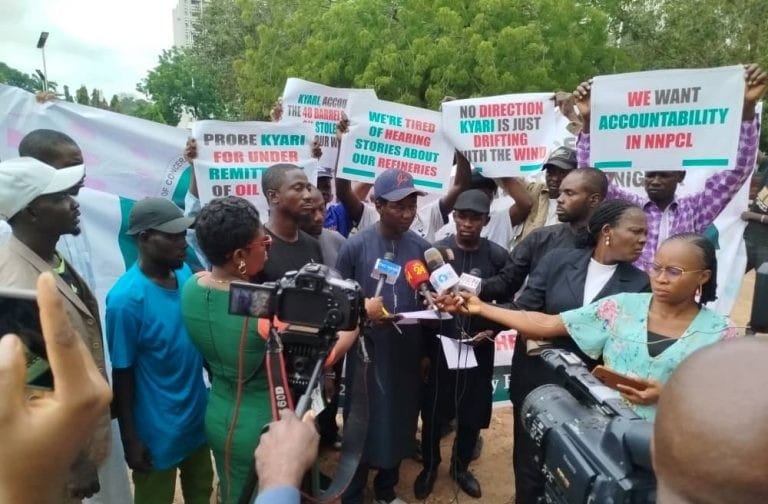Abuja witnessed a wave of protests on Monday as demonstrators took to the streets, demanding the immediate dismissal of Mele Kyari, the Group Managing Director of the Nigerian National Petroleum Corporation Limited (NNPCL). The protests were fueled by widespread frustration over the ongoing fuel scarcity that has gripped the nation.
The demonstration follows a recent admission by the NNPCL that its substantial debt to suppliers is jeopardizing the sustainable supply of fuel across the country. The corporation’s financial woes have raised serious concerns about its ability to maintain stable operations, exacerbating the already dire situation.
Prominent human rights lawyer, Femi Falana, expressed alarm over the worsening cost of living, the arbitrary increase in petrol prices, and the resulting scarcity that has led to a noticeable reduction in vehicles on Nigerian roads. Speaking as a guest on Channels Television’s *Politics Today* on Sunday, Falana called for an end to what he described as the “monumental fraud” surrounding fuel importation in Nigeria.
During the protest, demonstrators chanted solidarity songs and carried banners with messages such as “We are tired of fuel scarcity and excuses for non-functional refineries,” “No direction under Kyari,” and “We want accountability in the affairs of NNPCL.” They expressed their dissatisfaction with Kyari’s leadership, accusing him of failing to address the country’s fuel crisis effectively.
Aminu Abbas, the Convener of the Coalition of Concerned Civil Society Organizations, spoke to the media at Unity Fountain, emphasizing the need for immediate action. “To President Ahmed Bola Tinubu and all those in positions of power, we say the time to act is now. Show us that you stand with the people, not those who profit from our misery. Mr. Kyari must be shown the way out, and the NNPCL must be reformed to serve the interests of all Nigerians. We will not be silenced,” Abbas declared.
He further criticized Kyari’s tenure, stating, “The fuel scarcity we endure today is not just a mere inconvenience; it is a calculated perpetuation of suffering. Under Mr. Kyari’s leadership, the situation has gone from bad to worse, with no end in sight. What has he done to alleviate this crisis? It is clear he seems intent on maintaining a status quo that benefits only a select few while the masses suffer.”
Abbas questioned why a nation as rich in oil resources as Nigeria continues to experience severe petrol shortages, adding, “Why do we, the people, have to endure endless queues, inflated prices, and the daily uncertainty of whether we can fuel our vehicles or power our homes? The answer lies in the gross incompetence and mismanagement that have become the hallmarks of Mr. Kyari’s leadership.”
